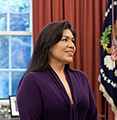Non-voting members of the United States House of Representatives facts for kids
Non-voting members of the United States House of Representatives are special representatives from certain U.S. areas. They are called delegates or, for Puerto Rico, the resident commissioner. These members speak for their homes in the House of Representatives, but they cannot vote on new laws in the main House meetings.
However, these members are still very important! They can join in many other activities in the House. For example, they can vote in special House committees they belong to. They can also suggest new laws, just like other members.
There are currently six non-voting members. One delegate represents Washington D.C., which is the capital city. One resident commissioner represents Puerto Rico. The other four delegates represent different U.S. territories where people live: American Samoa, Guam, the Northern Mariana Islands, and the U.S. Virgin Islands. There has also been a suggestion for a seventh delegate to represent the Cherokee Nation, but this person has not officially joined yet.
Contents
What Are Non-Voting Members?
Non-voting members are like special messengers for their territories. They make sure the voices and needs of the people in their areas are heard in the U.S. Congress. Even though they can't cast a final vote on laws in the full House, they play a big role in shaping those laws. They work hard to bring attention to issues important to their homes.
Who Are These Members?
The United States has several territories and a special capital district. People living in these areas don't have a regular voting member in the House of Representatives. Instead, they have these non-voting delegates or a resident commissioner.
- Washington D.C.: This is the capital of the U.S. and has its own delegate.
- Puerto Rico: This large island territory has a resident commissioner.
- American Samoa: A group of islands in the South Pacific.
- Guam: Another island territory in the Pacific Ocean.
- Northern Mariana Islands: A commonwealth of the U.S. in the Pacific.
- U.S. Virgin Islands: A group of Caribbean islands.
What Can They Do?
Even without a vote on the final laws, non-voting members have important jobs:
- Voting in Committees: They can vote on bills and other matters when they are part of a House committee. Committees are smaller groups that study and change proposed laws before they go to the full House.
- Introducing Laws: They can write and introduce new bills, just like any other member of Congress. This means they can start the process for new laws that help their territories.
- Speaking for Their People: They represent the interests and concerns of the people in their areas. They can speak during debates and try to convince other members to support their ideas.
- Helping Their Communities: They work to get federal funding and support for projects in their territories, like schools, roads, or healthcare.
How Are They Chosen?
Non-voting delegates are elected by the people in their territories every two years. This is the same election cycle as regular voting members of the House. The Resident Commissioner of Puerto Rico is elected every four years. This longer term helps them work on bigger projects for Puerto Rico.
Images for kids
-
Federico Degetau y González of Puerto Rico, the first resident commissioner in the United States Congress.
-
Walter E. Fauntroy, delegate from the District of Columbia from 1971 to 1991.
-
Choctaw Nation Delegate to Washington Peter Pitchlynn who served as ambassador from 1845 to 1861 and again from 1866 to 1881.
-
Cherokee Nation Delegate to Congress Kimberly Teehee.







